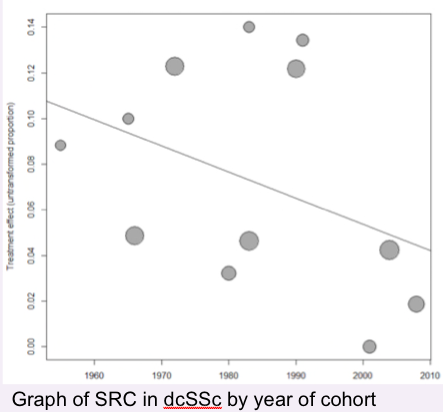Session Information
Date: Sunday, November 8, 2015
Title: Systemic Sclerosis, Fibrosing Syndromes and Raynaud's - Clinical Aspects and Therapeutics Poster I
Session Type: ACR Poster Session A
Session Time: 9:00AM-11:00AM
Background/Purpose:
Systemic sclerosis (scleroderma, SSc) is an autoimmune connective
tissue disease with increased mortality from various internal organ
involvement. Scleroderma renal crisis (SRC) usually occurs in the diffuse
cutaneous systemic sclerosis (dcSSc) subset. It causes acute severe
hypertension and acute renal failure. In recent years, it has been treated with
angiotensin-converting enzyme (ACE) inhibitors with great success and improved
mortality. The prevalence of SRC since its classification in the early 1970s
was determined as it is our impression that SRC prevalence is decreasing over
time.
Methods:
A review of published articles and unpublished data was conducted up
to May 2015 using MEDLINE, EMBASE, CINAHL, and Cochrane databases. Articles
were included if they pertained to the prevalence of SRC in a cohort of
patients. Articles were excluded if they were not in English, did not have a
cohort of at least 50 dcSSC patients, if they were review articles, or solely
abstracts.
Results: Of the 5306 citations identified, only 11 qualified.
They were from Europe, USA, Australia, UK, and India. Years of publication were
from 1983 to 2011 and cohort size varied from 68 to 3656 patients with SSc
totaling 11,139 patients (4,536 [40.7%] with dcSSc). Dividing data by year of
publication, before and including 1990, SRC occurred in 13.5% of dcSSc, from
2002 to 2007, SRC was in 7.9% and in 2010 and 2011, SRC had was infrequent at
2.4% (Figure). In lcSSc the range was from 0 to 4% with no obvious decreasing
over time.
Conclusion:
It
appears that SRC remains very uncommon in lcSSc and the rate in this group may
be stable over time. However, the frequency of SRC has dropped dramatically in
the dcSSc subset. The reasons for this are not known, especially as there is longer
survival in SSc. Prophylactic use of ACE inhibitors does not seem to decrease
the risk of SRC (observed in other studies) so it may be the changing etiology
of SSc over time.
To cite this abstract in AMA style:
Turk M, Pope JE. A Meta-Analysis to Determine If the Prevalence of Scleroderma Renal Crisis Decreasing with Time [abstract]. Arthritis Rheumatol. 2015; 67 (suppl 10). https://acrabstracts.org/abstract/a-meta-analysis-to-determine-if-the-prevalence-of-scleroderma-renal-crisis-decreasing-with-time/. Accessed .« Back to 2015 ACR/ARHP Annual Meeting
ACR Meeting Abstracts - https://acrabstracts.org/abstract/a-meta-analysis-to-determine-if-the-prevalence-of-scleroderma-renal-crisis-decreasing-with-time/

